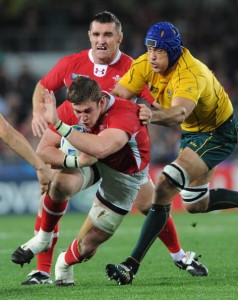
Opening gambit: Shane Williams, playing in his last RWC game, scored Wales' first try against Australia
By Sarah Mockford, Rugby World Features Editor at Eden Park
WALES DESERVED to end this World Cup with a win but it wasn’t to be. Neither Australia nor Wales excelled in a rather drab third-place play-off, but it was the Wallabies who emerged 21-18 winners at Eden Park.
Wales put together a great spell in the last five minutes, keeping the ball and working their way from their own half into Australia’s 22 before stretching the Wallabies defence to such an extent that Leigh Halfpenny skipped over for a late try. They should be credited for that commitment to a losing cause but ultimately it was a sad end to their tournament.
The men in red missed Rhys Priestland desperately, neither James Hook nor Stephen Jones looking comfortable at ten or bringing the best out of this back-line. So Warren Gatland’s side return home having finished fourth at the World Cup – and losing their three games by a total of five points. How much different would things have been had Priestland been fit or either of their other fly-halves had been able to slot a penalty or two.
It may have been a disappointing finish, but there are still positives they can take.…
1. RHYS PRIESTLAND
The effect of the Scarlets fly-half on this team was most evident when he wasn’t playing in Wales’ last two games. He’s an instinctive and clever player who plays flat and can time his passes to great effect, bringing his powerful midfield runners onto the ball at pace or spreading it wide to a dangerous back three. He should be installed in the No 10 shirt now and stay there all the way to RWC 2015. He’s responsible for getting Wales’ back-line firing again.
2. LLOYD WILLIAMS
He may have been limited to a bench role this time but expect him to have the No 9 on his back in four years’ time. He showed in the last 15 minutes against Australia what he’s capable of, keeping the tempo up as Wales pushed for that late try and taking play all the way to the Wallabies line. He can pass well off both hands and, more importantly, can pass quickly; he gets the ball out of the contact area as fast as he can giving Wales the best opportunity to do some damage.
3. THE BACK ROW
So much has already been said about Sam Warburton and his skills, but we shouldn’t forget his back-row buddies Dan Lydiate and Toby Faletau. Lydiate is one of the hardest workers in the team and puts in tremendous tackles while Faletau proved in the France defeat that he has a skill-set beyond his 20 years, controlling the ball at the back of a retreating scrum and getting Wales on the front foot with his powerful surges with ball in hand.
4. ATTITUDE
This Wales side are different from their predecessors. Young and confident, they play with a belief that the men in red have not always possessed. They’re serious about achieving success and are prepared to make the sacrifices for it, even if it means laying off the beers post-match. If they can maintain that attitude for the years to come and increase their self-belief even further they should do well. Very well indeed.







